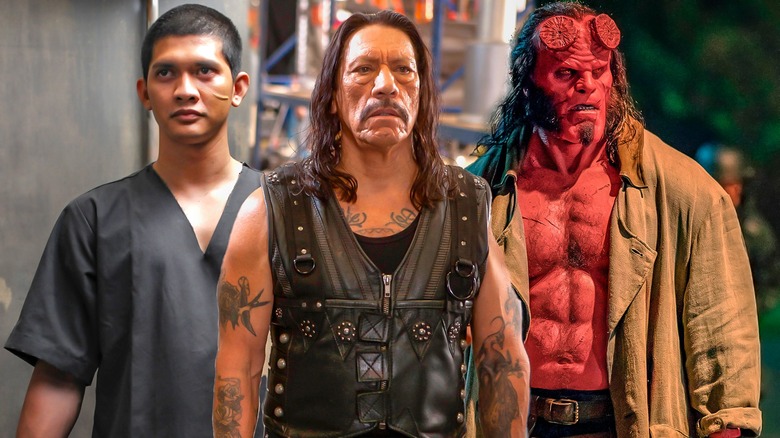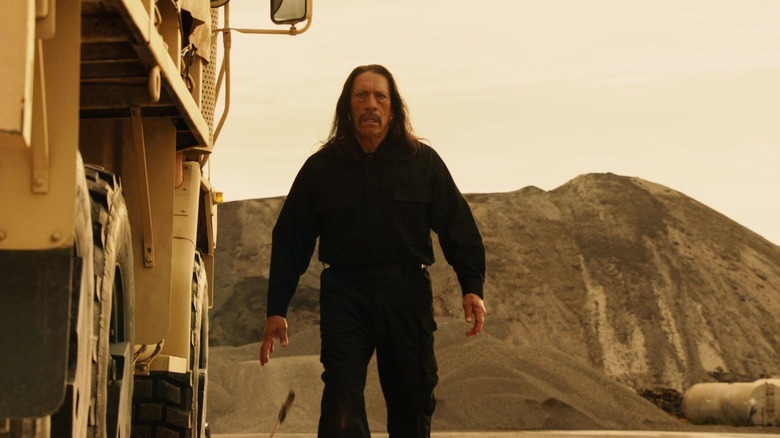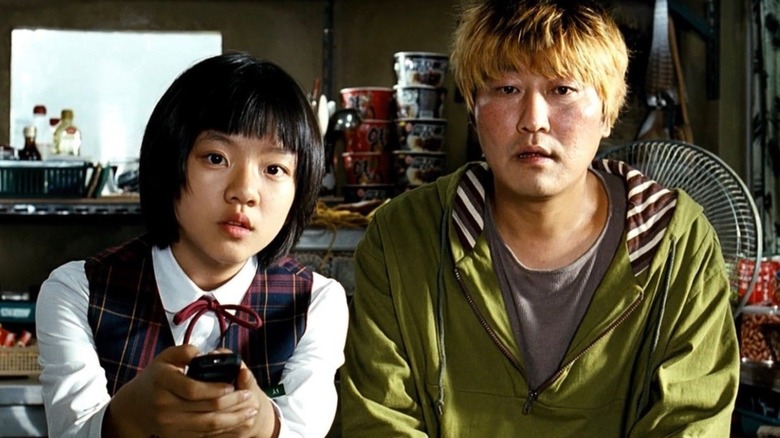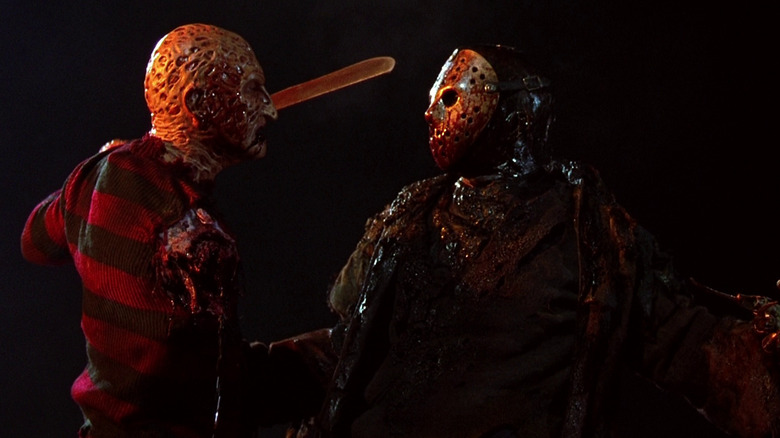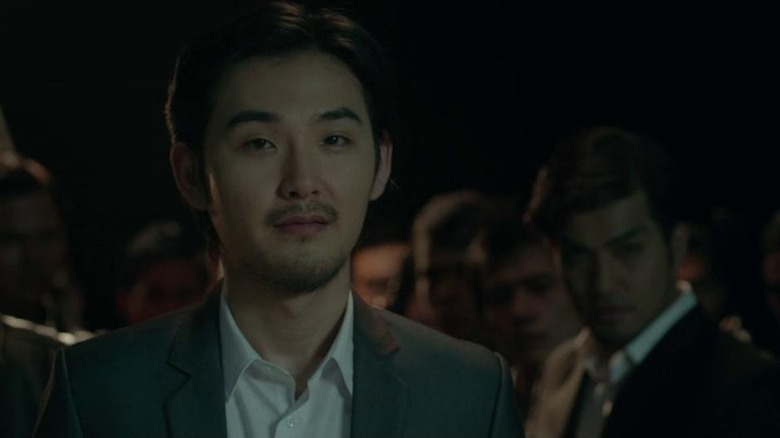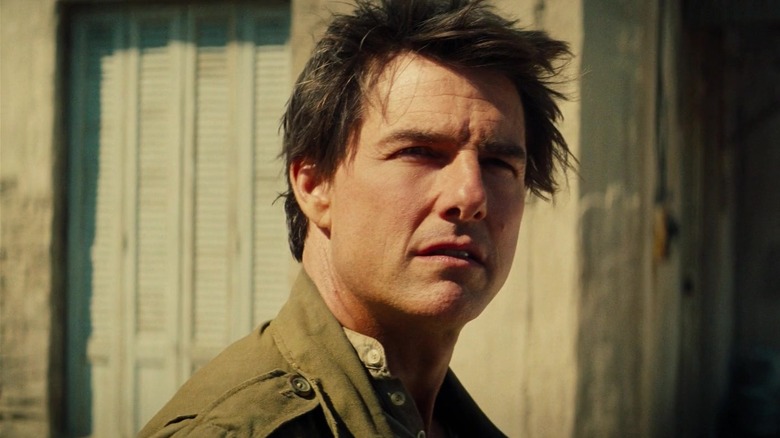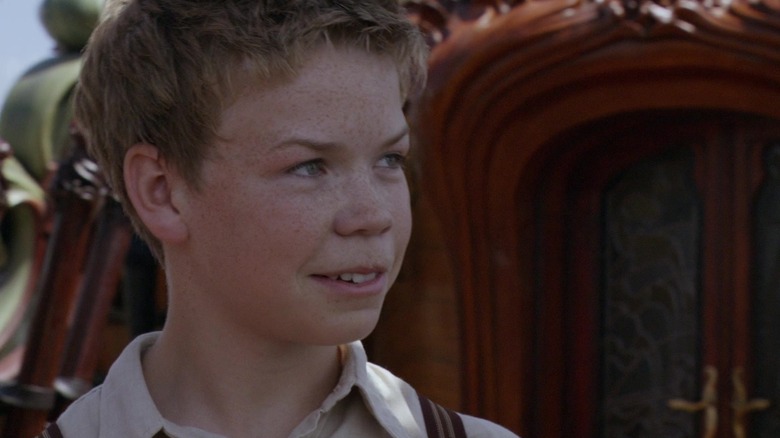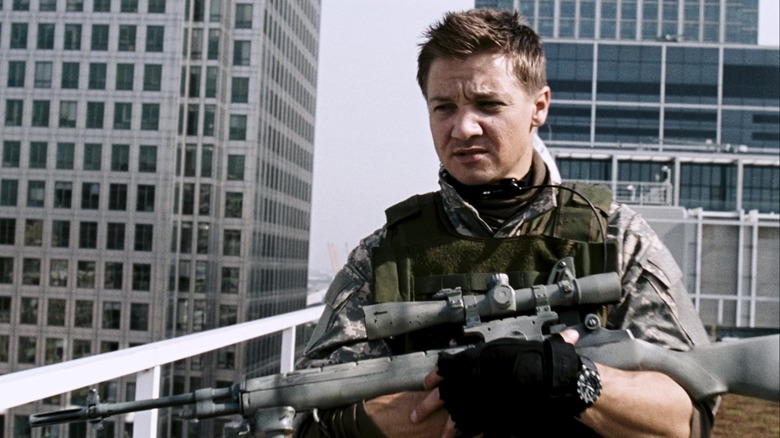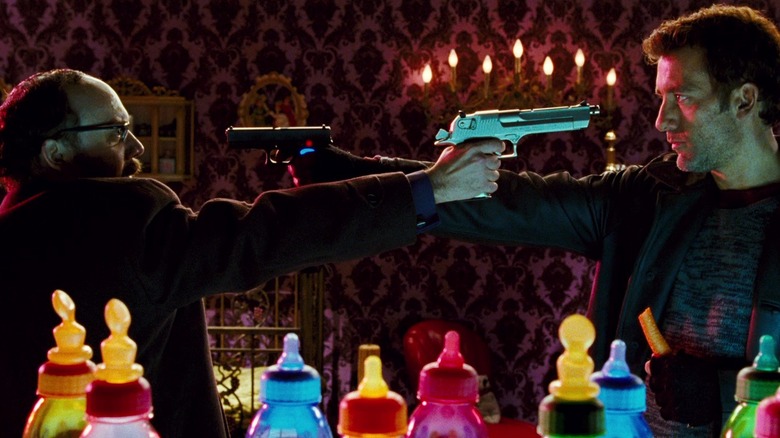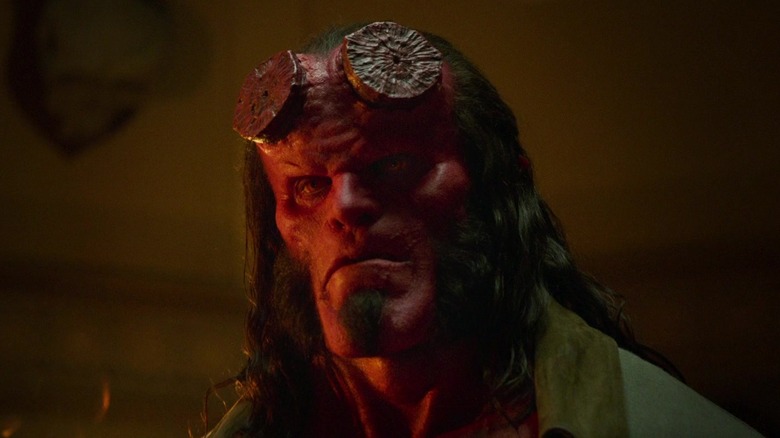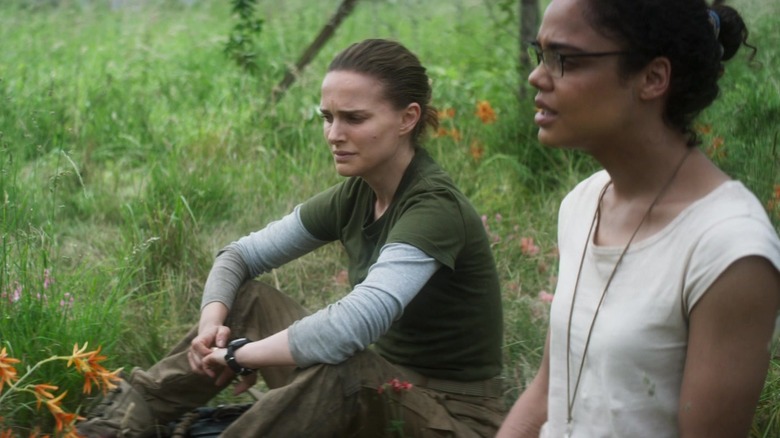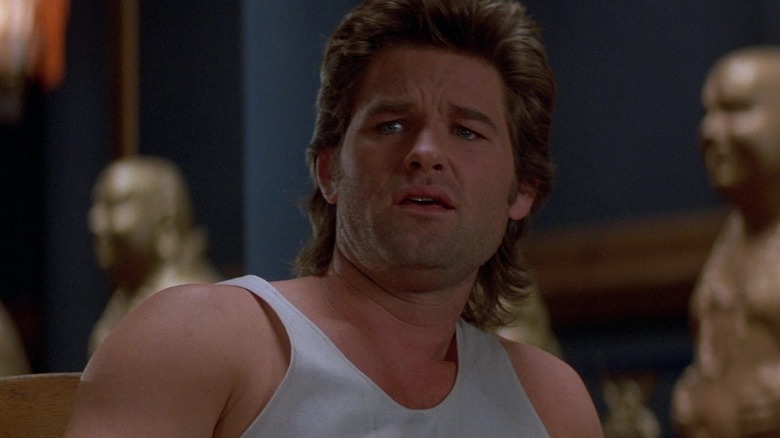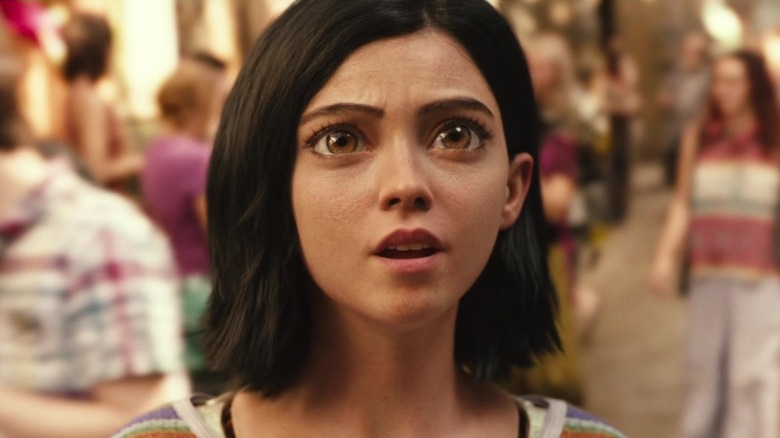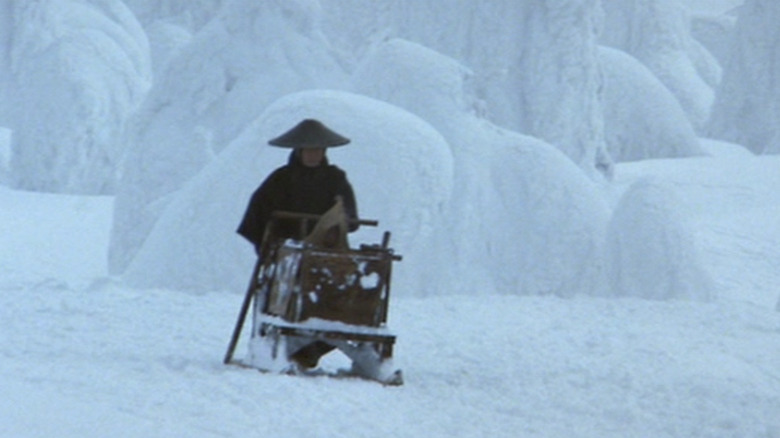13 Movie Cliffhangers That Were Never Resolved
One of the more frustrating experiences a cinephile can endure is a movie that ends with a cliffhanger that is left forever unresolved. Whether the story was unfinished or the ending snuck in a piece of sequel bait that went unseized, sometimes intended follow-ups simply never come to fruition. This might come about due to a studio shake-up, a poor box-office performance from the preceding film, or even because the director just lost interest in the project, plain and simple.
In this day and age, it is difficult to know when a franchise is truly finished with 100% certainty. Long-belated sequels, reboots, and requels are all the rage and have been for the last several years. A series can lie dormant for decades, then make a sudden return with movies like "The Matrix Resurrections" or the upcoming "Indiana Jones and the Dial of Destiny" tapping into cinemagoers' nostalgia for beloved franchises. No matter how old or how poorly received a movie may have been, there is always a chance that a studio might decide to try to milk a little more money out of the name recognition at some point in the future. While their fates could technically still change, here are 13 movies with cliffhanger endings that were left wide open and never resolved.
Machete Kills
The over-the-top exploitation film throwback "Machete" started out as a fake trailer sandwiched within Quentin Tarantino and Robert Rodriguez's "Grindhouse" double feature. Three years after he made the fake trailer, Rodriguez blew the premise up into a feature film, which was successful enough to greenlight a sequel.
Another three years passed before Rodriguez and star Danny Trejo returned with "Machete Kills" in 2013. This sequel ended with an appropriately over-the-top cliffhanger teaser for a third movie titled "Machete Kills in Space." In a throwback to the series' origins, the cliffhanger functions like a mini-movie trailer and contains plenty of footage from the supposed third movie.
"Machete" ended with a similar tease that promised the character would return in both "Machete Kills" and "Machete Kills Again." The first sequel teaser was delivered, but the conclusion to the trilogy never came. Rodriguez eventually said that he never planned on making "Machete Kills in Space" and only intended the cliffhanger tease as a joke. On the other hand, Trejo has gone on record multiple times as wanting to reprise the role one last time. When he went on the Black Oxygen Inspiration Podcast, Trejo jokingly said that Rodriguez needs to "stop being a b***h" and write the third movie already. Trejo also encouraged his fans to, "E-mail Robert Rodriguez, say 'let's do it homes, stop messing around.'"
The Host
Bong Joon-ho's 2006 monster movie "The Host" finds its heroes sustaining casualties but coming out on top at the end of the day. They seemingly defeat the terrifying fish creature that has been rampaging across the country, but the ending isn't perfectly cut and dry. In the final scene, Park Gang-doo (Song Kang-ho) grabs a rifle and looks out into the darkness at the monster that may or may not be there.
The film never provides a definitive answer, leaving the viewer with a lingering sense of potential danger. The cliffhanger was nearly delivered on with "The Host 2" almost happening over 10 years ago. An extended teaser sequence was released for the sequel that swiftly sets up a new group of characters and finds the same fish monster from the first movie — or possibly another of the same contaminated species — returning to wreak havoc in spectacular fashion. The teaser also doubled as a VFX breakdown, showing off the impressive technical work in the sequel.
Despite a ton of time and money clearly being spent on a follow-up, it never came to fruition and the project is now dead in the water. Back in 2010, Bong Joon-ho confirmed that the sequel was in development but that he wasn't involved and had no interest in being involved (via First Showing). He said that he doesn't care if they make a sequel, that he won't be involved, and that he's against making sequels to any of his films in general.
Freddy vs. Jason
"Freddy vs. Jason" was a matchup of horror icons for the ages. Freddy Krueger (Robert Englund) of the "A Nightmare on Elm Street" series and Jason Voorhees (Ken Kirzinger) of the "Friday the 13th" series went head-to-head in 2003 — with a gaggle of teenagers in the mix to inflate the body count. The reception was mixed, with some fans let down by this clash of horror icons while plenty of others left satisfied. Picking one of the legendary slasher villains to win was bound to be divisive either way, so the film opted instead for a have-your-cake-and-eat-it-too ending. At first, it appears that Voorhees comes out on top by decapitating Krueger. Then, in the closing seconds, Krueger's severed head looks directly at the camera and winks, revealing that the fight isn't over yet and that Voorhees is back in Krueger's dream world.
The door was left wide open for a sequel but, even two decades later, the slasher villains have never shared the screen again. The film was a massive financial success, earning over $114 million at the international box office against a budget of just $25 million, which makes it all the more surprising that a sequel was never made. A low-quality reboot for these big horror icons is never off the table, but a true "Freddy vs. Jason 2" is pretty much guaranteed to never happen for a myriad of reasons.
The Raid 2
"The Raid: Redemption" took a meager budget and a simple premise and became an international action sensation. The ending of the first film segued perfectly into the story of "The Raid 2" — which was actually written first. With their plots interlocking so smoothly and with both films turning out so great, it was a crushing disappointment for fans of the martial arts genre that this killer duology never became a trilogy.
"The Raid 2" ends with Rama (Iko Uwais) overcoming the near-impossible odds stacked against him and taking out all of his adversaries. Rather than cutting to credits following the final fight scene and serving up a conclusive ending, the film builds to a cliffhanger. Bloodied, bruised, and barely alive, Rama comes face to face with a new enemy in the form of the Japanese gangsters who were closing in on the Indonesian criminal empire. The final dialogue exchange between Rama and the head gangster is muted with only the film's soundtrack audible until Rama's final line: "No, I'm done."
Director Gareth Evans eventually confirmed that he no longer had plans to make the third film but that he did have firm plans in place to continue the story at one point. Evans has said that the third movie would have moved on from Rama as the central protagonist and instead focused more on the Japanese gangsters dealing with a close-to-home double cross (via Empire).
The Mummy
The blockbuster spin on the classic "The Mummy" story was at one point meant to kick off a whole cinematic universe for Universal Studios. In an attempt to duplicate the box office magic of the Marvel Cinematic Universe, the studio was hoping to launch the Dark Universe. The plan was to take all of the classic Universal monster movies and characters from the golden age of Hollywood and reboot them with a fresh coat of paint in a shared world. The cliffhanger ending of "The Mummy" set those plans in motion with the arrival of Russell Crowe as Dr. Jekyll — who seemed to be positioned as the Dark Universe equivalent of Nick Fury — to bring all of the other disparate lead characters together.
The critical and financial failure of "The Mummy" essentially killed the Dark Universe before it even got started. Other planned films were scrapped, and the previously announced stars that included Johnny Depp as The Invisible Man and Javier Bardem as Frankenstein's Monster were both hung out to dry with their respective movies canceled.
Universal abandoned the shared-world idea but didn't completely give up on the idea of bringing their old, iconic horror characters back for the modern age. The much smaller and more contained spin on "The Invisible Man" in 2020 (without Depp) proved far more successful than the blockbuster approach Universal took with "The Mummy."
The Chronicles of Narnia: The Voyage of the Dawn Treader
The hugely popular "Chronicles of Narnia" book series by author C.S. Lewis makes perfect sense to get the big screen treatment. The first film, "The Chronicles of Narnia: The Lion, the Witch, and the Wardrobe" was a massive box office hit, earning over $745 million worldwide. Unfortunately, this turned out to be the peak of the franchise, and "The Chronicles of Narnia" proved to be a series of diminishing returns.
The second movie, "Prince Caspian," was made for a substantially larger budget but brought in significantly less money. While the third outing, "The Voyage of the Dawn Treader" had its budget scaled back by nearly $100 million, it still struggled to turn a profit. Domestically, the third film was a complete flop, though it fared considerably better internationally.
The plan was to keep adapting the book series, and the fourth film was in pre-production and nearly started shooting, but the plug was pulled after the poor performance of "The Voyage of the Dawn Treader" and in the midst of a shake-up with the rights holders. When the movie franchise got the ax, there were still four books in the series left unadapted. Rather than ever delivering on the next sequel, it seems more probable that the franchise will be rebooted from scratch, or maybe adapted into a TV show similar to "The Lord of the Rings: The Rings of Power" Amazon Prime series.
28 Weeks Later
Danny Boyle's "28 Days Later" was a game-changer for the zombie genre as it popularized the notion of faster, more vicious zombies. By the time the credits rolled, the plot of the film had reached a fairly conclusive end, and while the story didn't demand a sequel, one followed anyway.
Five real-world years later, "28 Weeks Later" hit theaters in 2007. Rather than continuing the stories of any of the surviving characters from the first movie, the sequel took a different approach by looking back at the same world from further into the apocalypse. Just like the first film, the core plot came to a relatively conclusive end by the time the credits rolled, but this time there was a bit of sequel bait sewn onto the closing moments. The film's epilogue offers a brief glimpse of zombies running near the Eiffel Tower, indicating that the infection has spread from London to Paris.
Many expected that a "28 Months Later" sequel would follow, but 15 years passed without another film in the series. Rumors recently began circulating that "28 Months Later" is finally happening, but it's a pretty big stretch leap to that conclusion. Boyle simply said he would be tempted to do it, but nothing is actually in motion. Cillian Murphy also said he would be keen on the project but confirmed that nothing is currently in the works. Given that Boyle and Murphy weren't involved in "28 Weeks Later" anyway, they aren't really the keyholders to the third movie getting made in the first place.
Shoot 'Em Up
"Shoot 'Em Up" is a fun and over-the-top action comedy from 2007 starring Clive Owen as the enigmatic Smith — a carrot-chomping gunslinger with a short temper but a heart of gold. After killing the main villain, Hertz (Paul Giamatti), and resolving the main plot, Smith falls headlong into a brand new deadly altercation in the film's final scene.
While still bandaged up from all his wounds and taking a moment to unwind in a diner with Donna (Monica Bellucci), the two find themselves caught up in the middle of an armed robbery. Smith intervenes to save the day and gun down the robbers — with the aid of one of his trusty carrots — before the film cuts to black mid-gunshot. These robbers are clearly no great challenge to Smith after taking out many tougher opponents throughout the rest of the film, but the fallout of this broad-daylight, public shooting could easily propel him into another larger crime plot in the sequel. "Shoot 'Em Up" feels perfectly positioned to be the start of a new series, but the sequel potential was left sadly unfulfilled. The film was a major box office bomb and earned back less than one-third of its production budget at the domestic box office, precluding any possibility for a sequel and putting a shiner on the writer and director Michael Davis' promising career.
Hellboy
The 2019 reboot of "Hellboy" wound up being a one-and-done affair, but that wasn't always meant to be the case. The movie was meant to kick off the start of a new franchise, and the post-credits scene attempted to seal the deal on the sequel. A surprise double-cross cliffhanger left the plot wide open, and the ramifications of that development would have been tackled in the next movie — but it never came to be.
"Hellboy" was a critical flop and a box office disappointment, making less than half of its budget back at the domestic box office and not faring much better overseas. The studio kept quiet on the matter, but star David Harbour all but confirmed that the series was dead and buried when asked about a potential sequel.
Guillermo Del Toro's earlier incarnation of "Hellboy" was similarly left hanging. Del Toro directed the original film and the sequel "Hellboy II: The Golden Army," but he wanted to round out a trilogy with the titular character. Instead, the series was cut short. Ron Perlman has gone on record recently saying that he would still be up to reprise the role despite being in his 70s, but Del Toro's third "Hellboy" might not ever happen either. It seems the character is somewhat cinematically cursed, with both attempts being prematurely cut short.
Annihilation
Alex Garland's "Annihilation" was adapted from the novel of the same name written by author Jeff VanderMeer and was one of the best sci-fi films — with a strong horror streak — in recent memory. The film concludes with Lena (Natalie Portman) returning from beyond the shimmer before the twist reveal leaves the audience on a cliffhanger ending. Though she seemed to beat the alien and escape alive, the main character may not be who she appears and might actually be the copycat alien instead.
Given that the book the film was adapted from is actually just the first novel in VanderMeer's "Southern Reach" series there is obviously much more to the story. The poor box office results of "Annihilation" would likely prevent a sequel from getting made, but even if the film had resulted in a financial windfall, the cliffhanger still might have been left unresolved on the big screen anyway.
Garland — who wrote and directed the adaptation — said from the get-go that he would not be making a sequel and had no interest in adapting anything more than the first book. He told the cast, crew, and studio up front that "Annihilation" was going to be a contained film. He has said that he is open to someone else making a sequel and adapting the other books in the series but that he won't ever do it himself because he doesn't make sequels, full stop.
Big Trouble in Little China
"Big Trouble in Little China" is John Carpenter's gonzo kung-fu flavored fantasy adventure film from 1986. Kurt Russell stars as Jack Burton, a confident but largely incompetent truck driver who gets tangled up in a rescue mission involving magical creatures, evil sorcerers, and a supernatural underground society. Burton and Wang (Dennis Dun) save the day by the end of the film, but there's one last surprise in store. As Burton moves on and boasts over the C.B. radio of the Pork Chop Express, a monster bursts out of the back of his truck. This final moment is just enough to tease a sequel and confirm to viewers that Burton's exploits aren't over yet.
Burton's life as a truck driver and his brushes with the supernatural seems like the perfect setup for a long string of loosely-connected sequels as he travels from place to place and gets into other wacky adventures, but "Big Trouble in Little China" remained a standalone film for many decades. Recently, Dwayne 'The Rock' Johnson has voiced his interest in bringing the world of "Big Trouble in Little China" back to the big screen in the same vein as his successful "Jumanji" requel. However, the future of that project hit some choppy waves behind the scenes, and its fate remains up in the air. Regardless of whether or not The Rock's version ever comes to be, John Carpenter was not happy about the prospect, saying, "They just picked that title. They don't give a sh** about me and my movie" (via Cinema Blend).
Alita: Battle Angel
From producer and co-writer James Cameron and director Robert Rodriguez, "Alita: Battle Angel" is an adaptation of the manga series "Gunnm" by Yukito Kishiro. The movie is full of action and sci-fi world-building, but the plot was left incomplete. Beyond being a normal cliffhanger, "Alita: Battle Angel" ends at what feels like halfway through the story. With frequent but brief flashbacks only hinting at the titular character's past and without any real conclusion to the core story, the movie just stops happening at the end of its two-hour runtime.
Major plot promises go undelivered and were instead left for the sequel. The ending even teases a new key player with an uncredited cameo from Edward Norton as Nova, a substantial character from the source material. At one point, Cameron hoped to launch a whole franchise off the back of the Alita character and even threw out titles like "Alita: Fallen Angel" and "Alita: Avenging Angel" as sequels.
As disappointing as it would be to leave the story unfinished, an "Alita" sequel might not ever happen. A few years have gone by without the studio greenlighting a sequel, and a shake-up between 20th Century Fox and Disney makes it even less likely. There does, however, remain a sliver of hope. The major behind-the-scenes players of Cameron, Rodriguez, and star Rosa Salazar have all expressed interest in returning to "Alita," but Rodriguez and Cameron are both seemingly booked solid with other projects for the next several years. If the sequel does eventually happen, it likely won't be anytime soon.
Lone Wolf and Cub: White Heaven in Hell
"Lone Wolf and Cub" was a samurai movie series adapted from the manga of the same name beginning in 1972 with "Lone Wolf and Cub: Sword of Vengeance." The plot follows the former Shogunate Executioner Ogami Itto (Tomisaburô Wakayama) who had his status ripped away and became a wanted outlaw after being framed by the villainous Yagyu Clan. Now, Itto and his infant son Diagoro (Akihiro Tomikawa) walk the demon path in hell and take on freelance assassination jobs.
The plots of each film function largely as self-contained adventures, but the series also tracks the overarching plot of Itto's ongoing battle against the Yagyu Clan. "Lone Wolf and Cub: White Heaven in Hell" was the sixth entry in the series and wound up being the final film, but it wasn't supposed to be. This last outing finds Itto coming the closest he has ever been to killing Yagyu Retsudo (Minoru Ôki), the head of the Yagyu Clan and the series' returning villain. Rather than delivering the decisive blow, Retsudo slips away, ending the film on a cliffhanger.
At the time the movie series was laid to rest, the manga series it was adapted from was still ongoing, so there wasn't yet a canonical ending to Itto's saga. The biggest reason for the movie series ending early was that a separate adaptation of the same source material proved more popular. A television version of "Lone Wolf and Cub" overlapped with the movie series and wound up running for 80 episodes, and the films just couldn't compete with this second canon.
